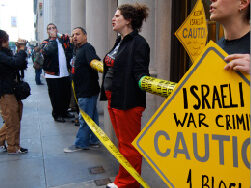


AsJews committed to confronting racism, we regret that the Simon WiesenthalCenter is on the wrong side of justice yet again: It has demanded that Germanywithdraw from the international meeting scheduledSeptember 22, 2011, to commemorate the 10th anniversary of theDurban Declaration and Programme of Action on Racism (Durban Review). The Simon WiesenthalCenter is using its clout and undeserved reputation to whitewash Palestiniandispossession and provide cover for racism and apartheid.
We urge the government of Germany topursue its obligation to stop the racism of today and redress the injustices ofyesterday by re-committing to its participation in the Durban Review.

As anti-Zionist activists -- women andmen of many religions and of none, in and around the Labor Movement in Canada, theUnited States and the UK -- we are delighted to be represented here in Cairo atthis historic moment. Like everyone who wants a better world for workersand our families, we acknowledge that when the people of Egypt (Shaab alMasri) in their millions revolt against injustice, it is a defining momentfor workers around the world.
We send thankful greetings to thepeoples of North Africa and South-WestAsia who have launched a new wave of international revolutionary activity which has had animmediate impact as far afield at least as Madison,Wisconsin (USA). The occupation ofthe Wisconsin State House has joined the immigrant rights movement and others ingiving new life and energy to working class movements (union and non-union) inthe United States. It was followed inArizona by students using the same tools as their counterparts here, occupyingthe school board and chainingthemselves in; while in Olympia, Washington State, students and unions occupiedthe state capital also protesting budget cuts. In Wisconsin, directly influenced byTahrir Square, students, young people, seniors, unionists and mothers withchildren, occupied a US State House for the first time in living memory andheld it for weeks, redecorating the building with picket signs, banners,slogans and other symbols of resistance in defiance of the state governor.

CONTACT
FOLLOW US
SUBSCRIBE TO OUR NEWSLETTER
BUSINESS OF BACKLASH
Click here to download the 120-report which exposes the funders of Zionist backlash on campuses and in communities
SEARCH THE SITE
NAVIGATION
WHO WE ARE
NEWS & OPINIONS
PROJECTS & CAMPAIGNS
CHAPTERS & SECTORS
RESOURCES
GET INVOLVED

